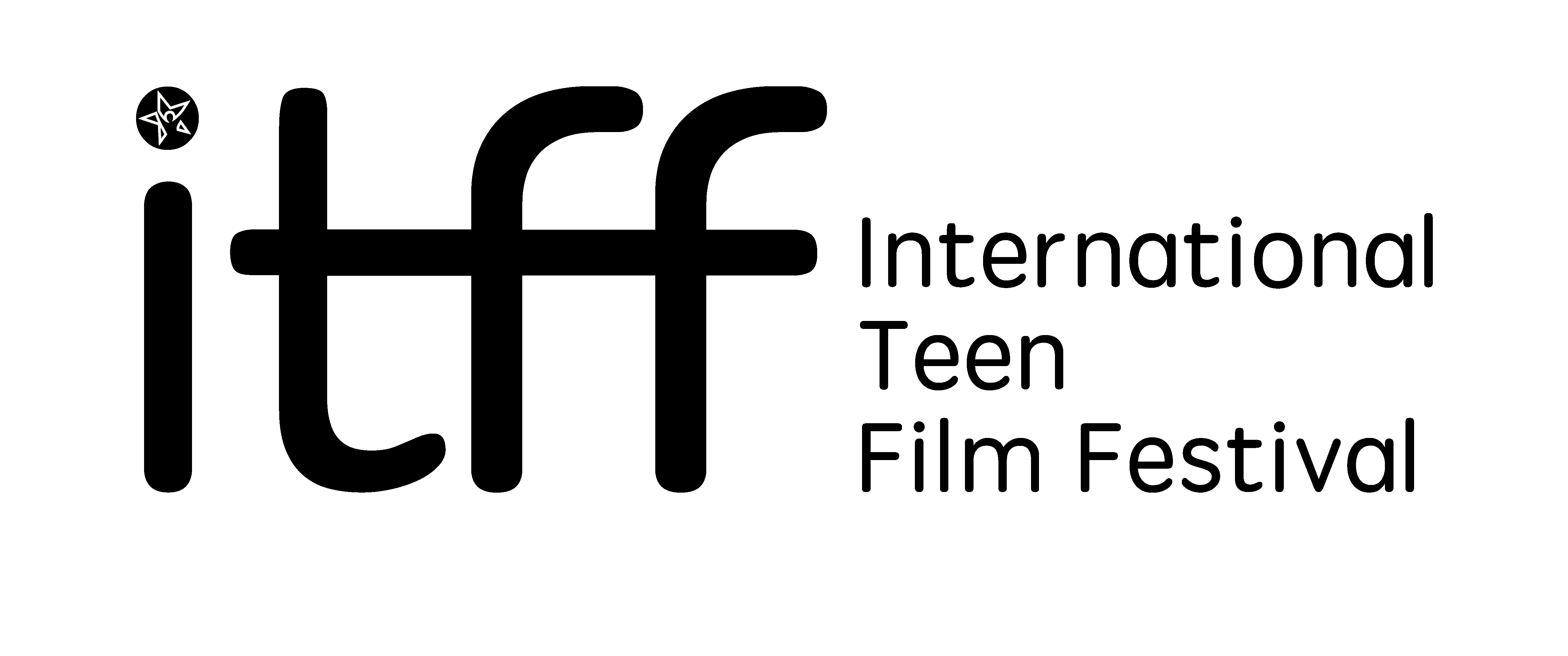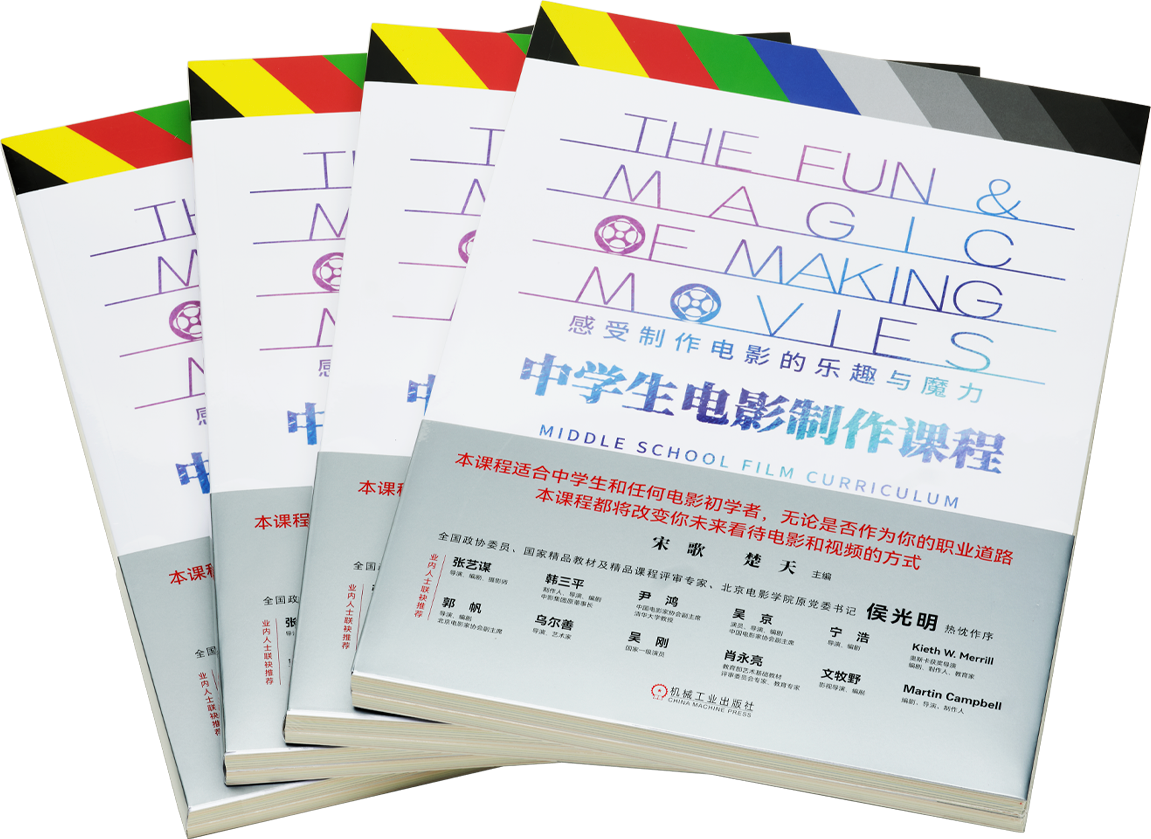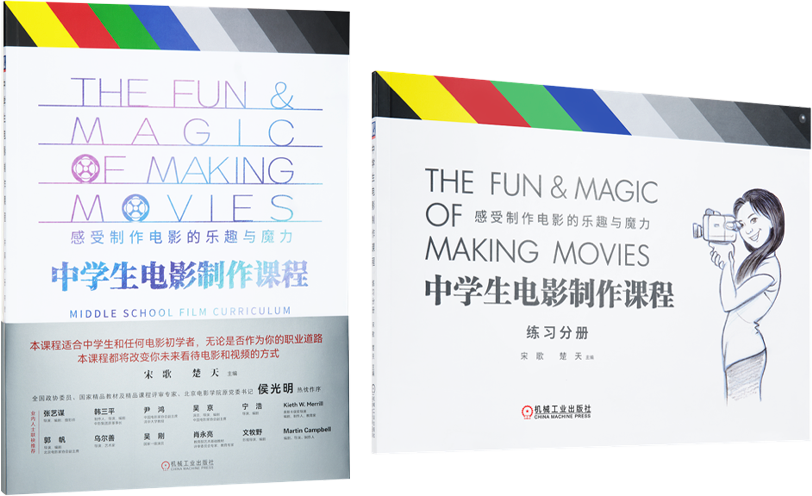 Educational Support
The First Book For The Future Filmmaker
Educational Support
The First Book For The Future Filmmaker

MIDDLE SCHOOL FILM CURRICULUM
After years of research and development, the study book has received strong support from the education and film industry. Published by theMachinery Industry Press, it is a very advanced systematic textbook in the world, and is rated by Hou Guangming, a member of the NationalCommittee of the CPPCC/National high-quality textbooks and high-quality curriculum evaluation experts, as "This is a film textbook espe-cially suitable for middle school students, filling the gap of domestic middle school students learning to shoot movies without targeted text-
books".
The curriculum of the system is composed of general studies books, student manuals, teacher manuals (teaching staff), and annual teaching
plans for teachers. The General Studies book and the student handbook are public publications. Teacher's books and lesson plans are
non-public materials.
The book is foretold by Hou Guangming, member of the National Committee of the Chinese People's Political Consultative Conference
(CPPCC), expert in the evaluation of national high-quality textbooks and high-quality courses, and former secretary of the Beijing Film
Academy. Famous director Zhang Yimou, Vice Chairman of China Film Association/Professor of Tsinghua University Yin Hong, famous
producer/former chairman of China Film Group Han Sanping, Oscar-winning director/educator Kieth W. Merrill seriously recommend.
Famous director Ning Hao, famous director/actor Wu Jing, famous director Wu Ershan, famous director Guo Fan, famous director Wen
Muye, famous actor Wu Gang, educational philosopher Gwen Andrus, education expert Xiao Yongliang of the Ministry of Education, Execu-
tive Committee member of China Film Directors Association/famous director Zhang Yibai and many other industry people jointly recom-
mended.
After years of research and development, the study book has received strong support from the education and film industry. Published by theMachinery Industry Press, it is a very advanced systematic textbook in the world, and is rated by Hou Guangming, a member of the NationalCommittee of the CPPCC/National high-quality textbooks and high-quality curriculum evaluation experts, as "This is a film textbook espe-cially suitable for middle school students, filling the gap of domestic middle school students learning to shoot movies without targeted text-
books".
The curriculum of the system is composed of general studies books, student manuals, teacher manuals (teaching staff), and annual teaching
plans for teachers. The General Studies book and the student handbook are public publications. Teacher's books and lesson plans are
non-public materials.
The book is foretold by Hou Guangming, member of the National Committee of the Chinese People's Political Consultative Conference
(CPPCC), expert in the evaluation of national high-quality textbooks and high-quality courses, and former secretary of the Beijing Film
Academy. Famous director Zhang Yimou, Vice Chairman of China Film Association/Professor of Tsinghua University Yin Hong, famous
producer/former chairman of China Film Group Han Sanping, Oscar-winning director/educator Kieth W. Merrill seriously recommend.
Famous director Ning Hao, famous director/actor Wu Jing, famous director Wu Ershan, famous director Guo Fan, famous director Wen
Muye, famous actor Wu Gang, educational philosopher Gwen Andrus, education expert Xiao Yongliang of the Ministry of Education, Execu-
tive Committee member of China Film Directors Association/famous director Zhang Yibai and many other industry people jointly recom-
mended.

I. Basic information of the course
English name : Middle School Film Curriculum
Target audience: Middle and high school students
Credits/hours: 32 weeks, 64 class hours
Teaching methods: lectures and actual shooting
Assessment method: attendance and actual shooting
Course description: Systematically guide students to learn basic knowledge from film history, film genre, story construction, script writing,film development and preparation, film shooting, post-production, film festival and exhibition system, and complete the creation of a 7-12minute digital short film in the whole process.
II. Teaching objectives and requirements of the course
Let the students systematically practice the process of professional video shooting. Lead students to learn the basic knowledge of film histo-ry, film genre, story construction, script writing, film development, film shooting, post-production, film festival and exhibition system, and
complete the creation of a 7-12 minute digital short film. Train students' ability of independent creation and teamwork. In the lecture part,
students have a better understanding of the professional process of modern live-action film shooting, and complete the own creation by ap-
plying the shooting knowledge and skills learned in class. At the end of the course, each class will complete a professional short film to ex-
press their thoughts and observations on society. At the end of the course, the completed works will be submitted to various student film fes-
tivals at home and abroad and their own premieres will be held.
III. Student learning outcomes
Learn about the key stages of film creation, preparation and production.
Discover the unique creative abilities.
Know what it takes to make a movie.
Create the own movies and learn and apply the rules of filmmaking step by step.
Participate in the class film project.
Learn the skill, art, and fun of making movies.
English name : Middle School Film Curriculum
Target audience: Middle and high school students
Credits/hours: 32 weeks, 64 class hours
Teaching methods: lectures and actual shooting
Assessment method: attendance and actual shooting
Course description: Systematically guide students to learn basic knowledge from film history, film genre, story construction, script writing,film development and preparation, film shooting, post-production, film festival and exhibition system, and complete the creation of a 7-12minute digital short film in the whole process.
II. Teaching objectives and requirements of the course
Let the students systematically practice the process of professional video shooting. Lead students to learn the basic knowledge of film histo-ry, film genre, story construction, script writing, film development, film shooting, post-production, film festival and exhibition system, and
complete the creation of a 7-12 minute digital short film. Train students' ability of independent creation and teamwork. In the lecture part,
students have a better understanding of the professional process of modern live-action film shooting, and complete the own creation by ap-
plying the shooting knowledge and skills learned in class. At the end of the course, each class will complete a professional short film to ex-
press their thoughts and observations on society. At the end of the course, the completed works will be submitted to various student film fes-
tivals at home and abroad and their own premieres will be held.
III. Student learning outcomes
Learn about the key stages of film creation, preparation and production.
Discover the unique creative abilities.
Know what it takes to make a movie.
Create the own movies and learn and apply the rules of filmmaking step by step.
Participate in the class film project.
Learn the skill, art, and fun of making movies.

The teacher's book consists of nine chapters. Each chapter contains specific content as well as
practical activities needed to teacheach part of the film course to middle school students.
The curriculum is divided into 160 lessons into 9 chapters (teachers plan according to their own teaching time).
Chapter 8 is the practical chapter.
Each chapter will have 10-16 lessons, 2 tests, and 1 project production.
The time allocation depends on the relevant importance of the information and the length of time the project will take.
The final completed class schedule will contain the time allocated to each class.
The amount of time allocated to different topics will be determined by the importance of those topics.
The final completed class schedule will include course time allocated to the manual as well as hands-on learning.
Middle school students film production course teaching plan
The teaching plan includes the teaching content and the allocation of class hours
Includes electronic courses and student videos for teaching reference
The curriculum is divided into 160 lessons into 9 chapters (teachers plan according to their own teaching time).
Chapter 8 is the practical chapter.
Each chapter will have 10-16 lessons, 2 tests, and 1 project production.
The time allocation depends on the relevant importance of the information and the length of time the project will take.
The final completed class schedule will contain the time allocated to each class.
The amount of time allocated to different topics will be determined by the importance of those topics.
The final completed class schedule will include course time allocated to the manual as well as hands-on learning.
Middle school students film production course teaching plan
The teaching plan includes the teaching content and the allocation of class hours
Includes electronic courses and student videos for teaching reference
Students can use this book as a key to unlock the movie world, and diligent interpretation and application
will produce remarkable results.
MIDDLE SCHOOL FILM CURRICULUM
is a practical manual. It covers the history of film, production techniques, story structure,screenwriting
and related terminology. It adheres to the slogan of developing aesthetic education in the new period and
cultivates young peo-
ple's innovative ability imperceptibly. At the same time, it fills a gap in similar publications by providing rigorous content covering theoreti-
cal skills, historical evolution, and film studies, making it an indispensable authoritative resource for middle school students and young film
lovers. Most importantly, it is filled with meaningful practice that allows students to truly internalize the concepts and knowledge presented.
It is very suitable for this age.
Adolescence is a formative period of life. Movies have a great influence on these growing young people. This course enhances children’s un-
derstanding of film, ignites their creative passion, imparts production knowledge and skills, broadens their knowledge base, refines their aes-
thetic sense, and introduces them to a better worldview. This Middle School Film Curriculum follows a modular approach. It not only in-
spires the curiosity of teenagers about creativity, but also cultivates their overall quality. While cultivating their artistic talents, they also
reached the peak of knowledge dissemination.
ple's innovative ability imperceptibly. At the same time, it fills a gap in similar publications by providing rigorous content covering theoreti-
cal skills, historical evolution, and film studies, making it an indispensable authoritative resource for middle school students and young film
lovers. Most importantly, it is filled with meaningful practice that allows students to truly internalize the concepts and knowledge presented.
It is very suitable for this age.
Adolescence is a formative period of life. Movies have a great influence on these growing young people. This course enhances children’s un-
derstanding of film, ignites their creative passion, imparts production knowledge and skills, broadens their knowledge base, refines their aes-
thetic sense, and introduces them to a better worldview. This Middle School Film Curriculum follows a modular approach. It not only in-
spires the curiosity of teenagers about creativity, but also cultivates their overall quality. While cultivating their artistic talents, they also
reached the peak of knowledge dissemination.




COPYRIGHT
©
2022 - ITSFF - ALL RIGHTS RESERVED.